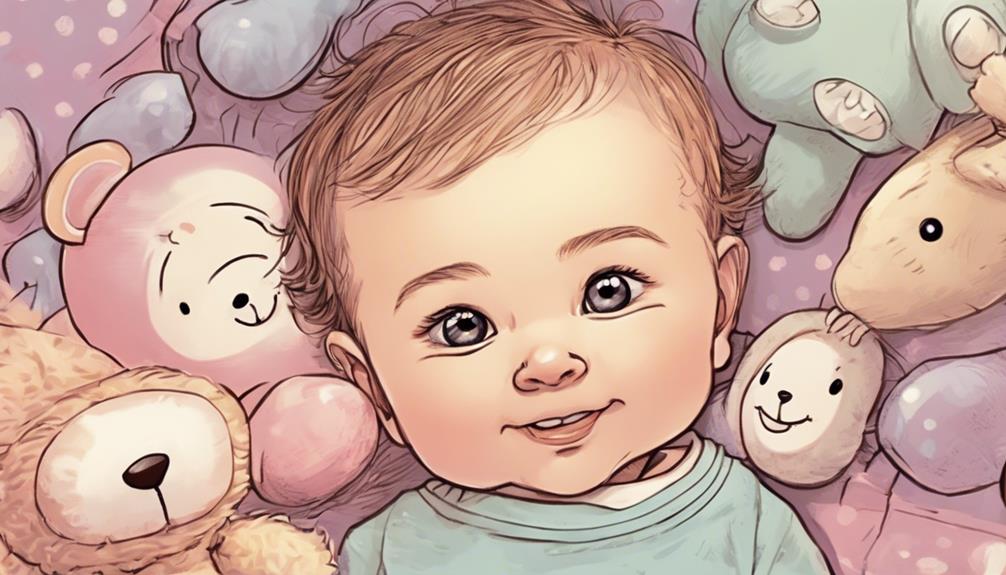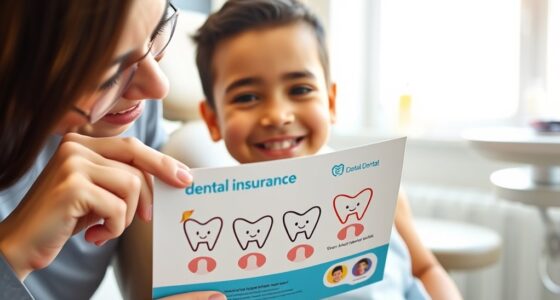Yes, many babies grind their teeth, which is quite common, especially around six months, when teething begins. This behavior, known as bruxism, often arises in response to discomfort from teething and is usually a part of natural development. You might notice loud grinding sounds during sleep, irritability, or sensitivity in the gums. Most kids outgrow this by age six, but regular dental check-ups are essential to monitor their oral health. If grinding persists or worsens, it may be worth exploring further solutions to protect your baby's teeth and comfort. Discover more about what you can do next.
Key Takeaways
- Teeth grinding, or bruxism, commonly starts around 6 months of age during teething as an instinctive response to discomfort.
- This behavior is typical among infants and usually resolves by age 6 with proper dental monitoring.
- Grinding may be triggered by teething pain, stress, or dental misalignment, and can also be influenced by genetics.
- Symptoms include loud grinding sounds during sleep, irritability, and potential gum sensitivity or swelling.
Understanding Bruxism in Babies
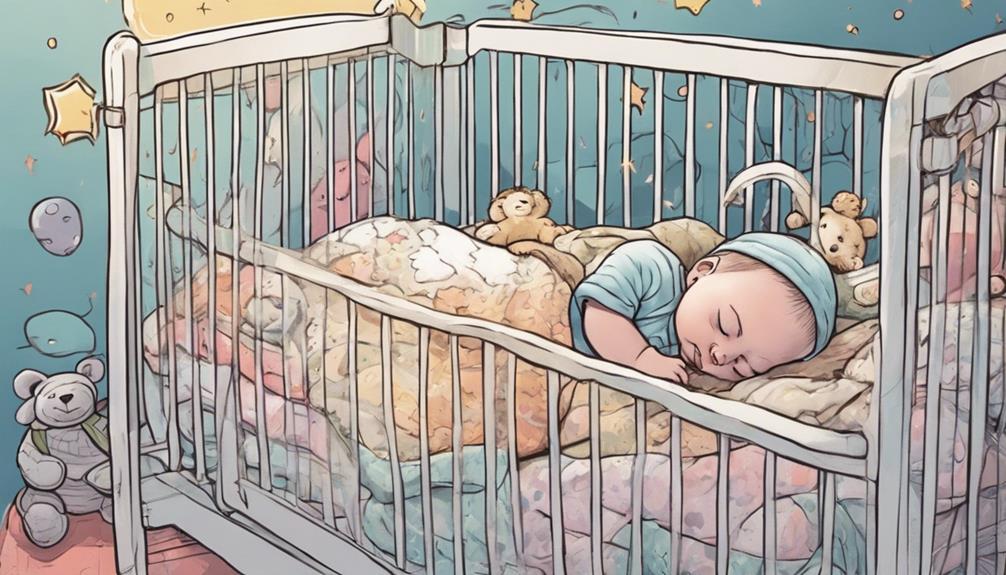
Understanding bruxism in babies starts with recognizing that teeth grinding often begins around 6 months of age as they experience teething discomfort. This behavior, known as bruxism, can be alarming for parents, but it's important to know that it's quite common among infants and toddlers.
As your baby's first teeth emerge, they may instinctively grind their teeth in response to the discomfort, making it a natural phase in their development. This grinding may also happen when they are feeling anxious or stressed. Many children eventually grow out of this habit as they get older and their jaw muscles mature. That’s why children grind teeth, and it’s important to monitor the frequency and severity of grinding to ensure it does not cause any long-term damage to their teeth.
Bruxism can also manifest as jaw clenching or irritability, which might be concerning for you as a parent. While it can lead to signs of dental wear on your baby's teeth, the good news is that most children outgrow this habit by the age of 6.
Regular dental check-ups are essential during this time to monitor your child's oral health and address any potential issues caused by grinding.
Causes of Teeth Grinding
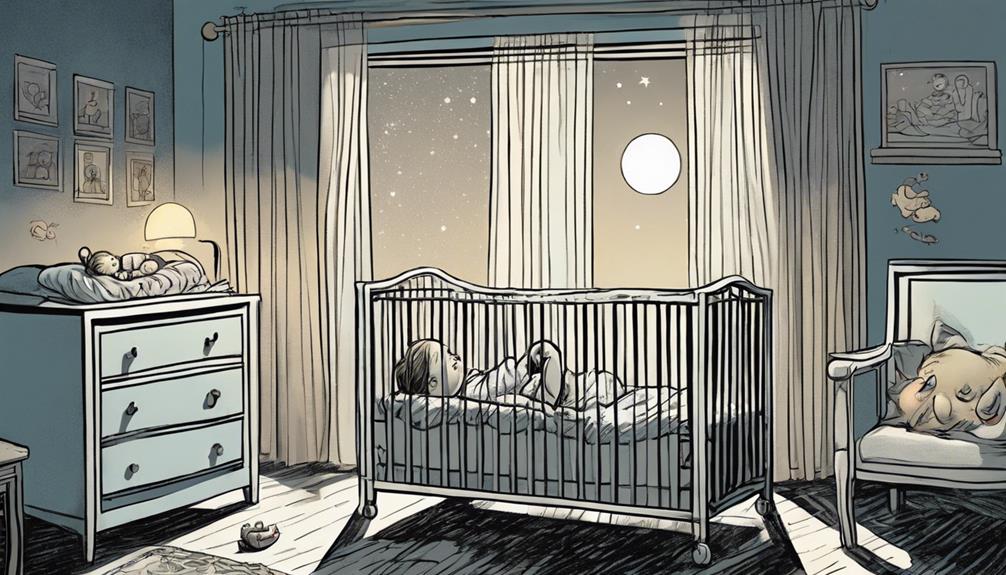
Teeth grinding in babies can stem from a variety of causes, including teething discomfort, stress, and even dental misalignment. When your baby's first teeth emerge, usually around 4 to 6 months, you might notice them grinding their teeth. This behavior, known as bruxism, is usually a response to discomfort during the teething process.
Stress or anxiety can also trigger teeth grinding in young children. Changes in their environment, such as starting daycare or experiencing parental separation, can lead to increased tension. Additionally, if there's a misalignment of teeth or jaw issues, it might create discomfort that prompts grinding behavior.
Certain medical conditions can exacerbate the situation. For instance, ear infections or allergies that cause nasal congestion can disrupt sleep and lead to grinding at night. It's important to observe if your baby shows signs of discomfort during these episodes.
Symptoms of Teeth Grinding
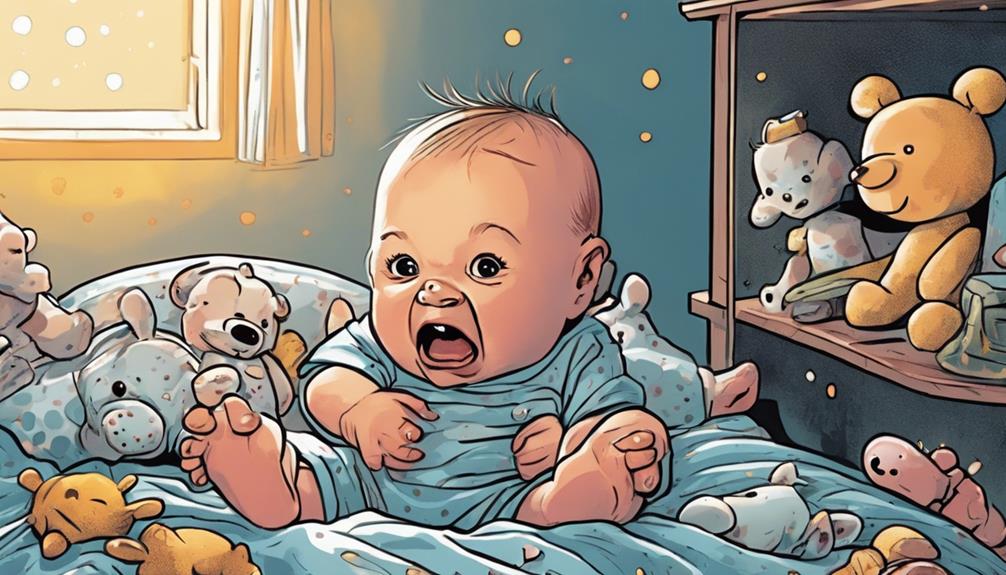
If your baby is grinding their teeth, you might notice some clear signs.
Loud grinding sounds can disrupt sleep, and you might see rhythmic jaw clenching during the day or night.
Keep an eye out for worn enamel or increased fussiness, as these could indicate complications from the grinding.
Common Signs Observed
Loud grinding sounds during the night often signal that your baby might be grinding their teeth, causing disruptions for both them and you. It is crucial to recognize the common signs of this condition, as they can help you address the issue early on.
| Sign | Description | Impact |
|---|---|---|
| Grinding Sounds | Loud noises heard at night | Disturbs sleep for baby and parents |
| Bruxism Behavior | Rhythmic jaw clenching during sleep | Indicates teeth grinding |
| Worn-Down Enamel | Visible erosion of baby teeth | Detected during dental check-ups |
| Irritability | Increased fussiness in your baby | Affects mood and comfort |
| Gums Sensitivity | Swelling or tenderness of gums | Results from grinding pressure |
Potential Complications Arising
Bruxism can lead to significant complications, such as worn enamel and increased tooth sensitivity, affecting your baby's overall dental health. When teeth grinding occurs early, it can wear down temporary teeth, increasing the risk of decay. This can also impact the development of permanent teeth, potentially leading to misalignment or other dental issues later on.
You might notice symptoms like jaw pain or soreness, especially in the mornings after your little one has been grinding their teeth during sleep. This discomfort can also manifest as irritability or fussiness throughout the day, making it hard for your child to enjoy activities. Frequent teeth grinding may disrupt sleep patterns, resulting in restless nights for both you and your baby.
It's crucial to seek medical advice if you suspect bruxism is affecting your child's health. Early intervention can help manage symptoms and prevent long-term complications, like temporomandibular joint (TMJ) issues, which can develop over time.
Keeping an eye on your child's teeth grinding habits will help guarantee their dental health remains a priority. Don't hesitate to consult a pediatric dentist if you're concerned about your child's teeth or jaw health.
Effects of Bruxism
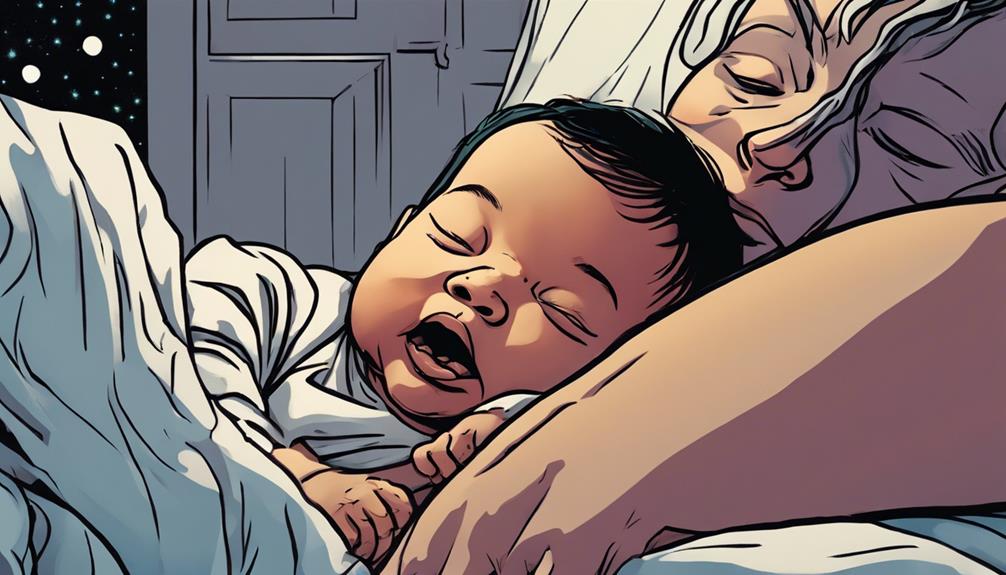
When your baby grinds their teeth, it can lead to both short-term and long-term effects that you should be aware of.
You might notice irritability or earaches in the short run, while long-term issues could include worn-down teeth and potential misalignment.
Keeping an eye on these effects through regular dental check-ups is essential for managing your child's dental health.
Short-Term Consequences
Have you noticed that your baby seems more irritable or fussy lately? If so, it could be linked to bruxism, where they grind their teeth. The short-term effects of this behavior can be quite uncomfortable for your little one.
For instance, grinding their teeth can lead to increased tooth sensitivity, making it painful for them to eat or drink. You might also observe signs of acute irritability, which may stem from discomfort caused by the grinding or underlying teething pain.
Additionally, the grinding sounds at night can disrupt sleep, not just for your baby but for you as well. This lack of restful sleep can further amplify your baby's fussiness during the day.
You may also notice swelling or sensitivity of the gums, which can add to their discomfort during feeding or oral hygiene routines. Overall, these short-term effects can create a cycle of irritability and discomfort that's hard to manage.
Keeping an eye on these signs can help you address bruxism early, ensuring your baby feels more comfortable and less agitated.
Long-Term Implications
Long-term teeth grinding can lead to serious dental issues, including significant wear and an increased risk of cavities and tooth fractures. If your child engages in tooth grinding, the long-term effects can be concerning.
Grinding happens during sleep and often goes unnoticed, but over time, it can contribute to enamel erosion, resulting in heightened tooth sensitivity. This sensitivity can make it uncomfortable for your child to enjoy hot or cold foods.
Moreover, persistent grinding may lead to misalignment of permanent teeth, potentially necessitating orthodontic treatment in the future. It can also cause temporomandibular joint (TMJ) disorders, leading to chronic pain and discomfort in the jaw and facial muscles.
While many children outgrow teeth grinding, the implications of prolonged bruxism can disrupt their sleep patterns, resulting in increased irritability and difficulty concentrating during the day.
Establishing a calming bedtime routine may help reduce the frequency of grinding and its associated risks. Regular visits to a pediatric dental professional can also guarantee that any potential issues are addressed early, safeguarding your child's dental health as they grow.
Monitoring and Management
Monitoring your child's bruxism is vital for identifying potential dental issues early and implementing effective management strategies. Keep an eye out for signs like visible wear on baby teeth or increased sensitivity, as these can indicate that grinding is affecting their dental health.
Regular dental check-ups are critical; they allow your dentist to assess the impact of bruxism on your child's oral health and recommend timely interventions if necessary.
You should also observe your child's sleep patterns and behaviors. Note any persistent grinding or symptoms like jaw discomfort and irritability, which can signal that they need extra support. Most children outgrow teeth grinding naturally by age six, but continued monitoring guarantees that you address any lasting effects on tooth alignment or overall dental care.
Establishing a calming bedtime routine can greatly help reduce instances of grinding. Incorporating relaxing activities before bed will improve sleep quality, thereby minimizing strain on their developing teeth and jaws.
Management Strategies
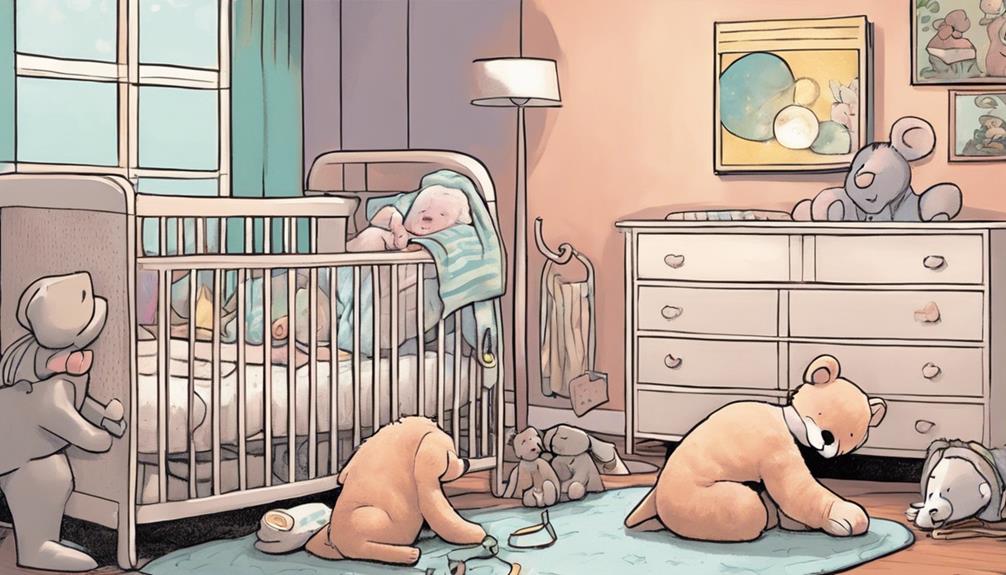
Establishing a calming bedtime routine can greatly reduce stress-related teeth grinding in babies and toddlers. Consider incorporating relaxing activities like reading or gentle music to help your child wind down. Offering teething toys made of soft rubber or cold materials can also provide comfort during teething phases, potentially alleviating grinding behavior.
It's vital to monitor and limit screen time before bed, as too much overstimulation can contribute to poor sleep quality and increased grinding. Consulting with a pediatric dentist can provide additional management strategies tailored to your child's needs. They may suggest natural remedies or even night guards for older children if grinding persists.
Regular dental check-ups are essential for monitoring your child's teeth and overall oral health. These appointments can help identify any wear from grinding and allow for timely intervention.
When to Seek Help
If your baby grinds their teeth persistently after the teething phase, it's crucial to consult a pediatrician or dentist for a thorough evaluation.
Persistent teeth grinding, especially beyond the age of 2-3 years, can indicate underlying issues that need attention. Look for visible signs of dental wear or discomfort in the gums; these warrant a professional assessment to prevent further damage.
If you notice an increased frequency of grinding along with jaw pain, headaches, or irritability, don't hesitate to seek immediate help from a healthcare provider.
These symptoms may suggest that the grinding is causing distress or that there's a more significant issue at play. Additionally, if your baby experiences behavioral changes or sleep disturbances alongside the teeth grinding, it's important to address these concerns promptly.
Consult a pediatric dentist if you have worries about jaw development, misalignment, or if the grinding continues despite trying home remedies.
A medical evaluation can help identify the root cause and guide you toward effective solutions to safeguard your baby's dental health and overall well-being.
Frequently Asked Questions
Is It Normal for a Baby to Grind Their Teeth?
It's common for babies to grind their teeth, especially during teething. Most cases are mild and resolve without treatment, but regular dental check-ups will help you monitor your baby's dental health and development.
How Do I Stop My Baby Grinding Their Teeth?
To stop your baby from grinding their teeth, establish a calming bedtime routine, offer soothing teething toys, monitor their sleep environment, and consider relaxation techniques. If it persists, consult a pediatric dentist for further guidance.
What Does Baby Teeth Grinding Sound Like?
When your baby grinds their teeth, you'll likely hear a rhythmic, abrasive sound, resembling two hard surfaces scraping together. It can range from a soft whisper to a more pronounced scraping, especially during sleep.
Do Babies With Autism Grind Their Teeth?
You might notice that some babies with autism grind their teeth. This behavior can stem from sensory issues or anxiety, often leading to dental concerns. Regular check-ups can help manage any potential problems effectively.
Can Grinding Teeth Affect What Foods My Baby Can Eat?
Yes, grinding teeth can affect the types of healthy foods for teething babies. The pressure from grinding can make it difficult for infants to chew certain foods. It’s best to focus on soft, nutritious options like purees, yogurt, and mashed fruits or vegetables to ensure they can eat comfortably.
Conclusion
To conclude, while it might be alarming to hear your baby grinding their teeth, it's a common issue affecting about 15% of children.
Understanding bruxism can help you manage it effectively. By recognizing the causes and symptoms, you can take proactive steps to alleviate any discomfort.
If you're concerned, don't hesitate to consult a pediatric dentist.
Remember, you're not alone in this—many parents face similar challenges.
Your baby's comfort and health are worth it!
